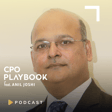Introduction to CPO Playbook Podcast
00:00:01
Speaker
I'm Felicia Shakiba, and this is CPO Playbook, where we solve a business challenge in every episode.
Navigating Total Reward Strategies
00:00:10
Speaker
This week, we're diving into the critical aspects of total reward strategies in the current competitive talent landscape.
Pay Equity and Compensation Challenges
00:00:18
Speaker
As companies strive to attract top talent, they often grapple with the complexities of pay equity, pay transparency, and the integration of AI in compensation planning. Recent insights from Harvard Business Review highlight how employers frequently pay new hires more than existing employees in similar roles, a practice that has been magnified by regulatory changes and technological advances.
Interview with John Radford Begins
00:00:46
Speaker
gaps will continue to widen over time, making it imperative for organizations to thoughtfully craft their compensation strategies. Today, I have the opportunity to speak with John Radford himself, founder at Radford Surveys, on how companies can compete for top talent in the future with total reward strategies.
00:01:09
Speaker
John, it's an honor to have you on the show today. Before we dive in, could you tell our listeners more about Radford Surveys and what you and your twin brother have created? Yes, but first let me thank you for inviting me. and We've had a practice session and I know this is going to be very informative. I graduated from the Stanford Business School in 1975 and my brother was working at Flurry Engineering conducting engineering surveys.
00:01:42
Speaker
and This was in Silicon Valley, yet to be named Silicon Valley. And we decided that there was a real need for a cross-functional compensation survey for all the firms in growing in Silicon Valley. And we started off in January of 1977 with our first survey. Luckily, we continued to focus on technology. And by the time I left Aion, the Red Fruit Survey was up to over 7,000 companies, 22 million incumbents in 110 countries, and was commonly understood to be the gold standard for technology companies. Very lucky. We had a lot of great employees and a lot of great clients.
00:02:25
Speaker
Well, I would say it's still the gold standard. You've continued to have that streak for sure.
Complexities of Pay Transparency Laws
00:02:31
Speaker
Recently you attended the World at Work Total Rewards Conference. What were some of the themes that came out of that conference? By far, the major theme was pay transparency. And let me define pay transparency, at least in relationship to state and local requirements. Pay transparency involves any time you post or advertise for a job, you must provide a salary range. And it also involves, in some states, also providing employees
00:03:07
Speaker
access to their own range, where they can determine where they stand in relationship to the midpoint of the range. It all started back in, I think, Colorado. They were the first state to implement a law requiring posting of jobs. And I remember working with our clients. They had to try to decide, do I post the whole range, only a portion of the range, or maybe only to the midpoint? And there's a lot of debate around that. Inter-California in 2023, they not only require that you post the range, but you also give employees access to their own range. And at that time, very few companies did that. And that created quite a problem. One, how do we get employees access to the range? Do we go through their manager or what?
00:03:54
Speaker
Two, we're not sure we have employees ranked in the right jobs. So when they asked their range, they may find out that, no, that's not my job. And three, it became crystal clear that employees were comparing the posted ranges to what they earned. And in some cases, like a software engineer would say, well, wait a minute, I can do that job that you posted for, but I'm in a much lower range. Why? So pay transparency has really taken over one additional note.
00:04:27
Speaker
CEOs, when they started providing employees in California access to their ranges, they said, well, wait a second. What about our employees in Austin, in Florida, in Chicago? So they demanded that HR departments gave employees access to their ranges anywhere in the United States. And that, of course, meant that they had really updated and had logical regional ranges for each of those areas, which also created more problems. So the whole discussion is around how do we take a company forward, not only with the legal requirements, but what is actually good for the company to promote to their employees.
00:05:07
Speaker
It sounds like there are a lot of pieces to this puzzle. And so I want to maybe start with what are those maybe one or two major challenges that companies are facing to providing transparency to employees? I know that you touched on it a little bit, but what would you say are the major crucial challenges for companies to focus on in regarding their initial initiatives? Yes, two things. One, they have to have very current market data for every region they compete in, because if they post a job and have insanely low ranges for that job, they're not going to get any applicants. And if they post a job that's way too high in ranges, they're going to have employees saying, well, what about me? So companies are scrambling to get really competitive market data. But the bigger problem, I think,
00:06:04
Speaker
is most companies are asking employees to go to their manager and the managers are uniquely unqualified to answer questions about pay. In fact, in the ah world at work, I saw a couple of statistics that said less than half the companies train managers to have salary and job slotting conversations with their employees. So Competitive data and train managers are the two real requirements of being successful in pay transparency.
EU Pay Equity Regulations Impact
00:06:40
Speaker
John, this is a real eye opener because I know that many times when people or employees have questions about compensation, they go through their HR business partner and HR as opposed to kind of manage these conversations. And rarely do you ever see training or manager 101 training that really encompasses how do you have compensation discussions with your team. And so I think you've really hit or highlighted something that a lot of companies maybe haven't thought about yet or maybe have been thinking about but don't know how to do. So how can companies train managers to effectively communicate about compensation with their direct reports?
00:07:28
Speaker
They have to devote tension and training to that. Managers need to understand the compensation philosophy of the firm. For example, where do they target their competitive rates? They need to understand the job architecture. and how they rank jobs into levels so they can describe for an employee why they're at one level and someone else is in another level. They need to understand the administration of salary increases, which involves performance ratings, budgets, all these things. And then they really need to understand having conversations with employees around, okay, you're in this range, but how can you move
00:08:13
Speaker
into a higher level. What do you have to do? A big emphasis on having managers understand career development steps within the company. and All that, quite honestly, just needs the company to focus on real training for the employees and And I heard one company talk about this anytime an employee went to HR because they said they couldn't get information from their manager. They helped the employee, but then went back to the manager and pointed out that they had had this conversation. And so the manager need to have more training. Caught the manager by surprise.
00:08:52
Speaker
Yes, they did. wow So perhaps weaving in how to have that conversation, I would say at Manager101 being new managers coming into the organization or someone being promoted into a manager position from being an an individual contributor. And that makes a lot of sense to me because I think that that is the trigger point in which you need to to have that. What regulatory changes in the EU specifically introducing around pay equity and how will this impact multinational companies? Holy smokes. You brought up maybe the most touchy subject that total rewards leaders have to face. The EU has already come out with a 70
Compensation Strategies and Market Positioning
00:09:42
Speaker
page white paper describing exactly what needs to be done and each country has to adopt
00:09:49
Speaker
those policies by, I believe, the middle of 2026. Some of the ones that are most challenging is, first, every company must have a gender-neutral analytical job evaluation methodology. and I can guarantee you, most companies don't have anything close to that. so They're all trying to decide, How do we meet that requirement in terms of our job structure? And that's going to be tough. The other thing is we're in California, you are being told you have to just simply give the employee their job range and how they compare. In the EU document, they are saying that an employee must not only get their job range, but they must also know how they compare to the average of other employees in the range.
00:10:41
Speaker
or a sub-functional group of job families or whatever. So their employees are not only going to find out how they really are in their range, more importantly, they're going to find out how they compare to their other employees. And that could be a real problem. The third area, and it's more technical, but I'll go into it. There is a unadjusted and adjusted pay equity measurement. You hear in the United States that women only make 83% of men. Well, that's unadjusted because you take all men and all women, and that's the number. And in companies, if they have more males higher up in the organization, the unadjusted pay gaps are going to be large. What US countries face is looking at the adjusted pay gaps, where there are typically only 3% or 4% differences or even less. And that's because they're comparing equivalent jobs.
00:11:34
Speaker
Well, in the EU, they're ignoring the adjusted pay gap, and they're saying if your unadjusted pay gap is more than 5%, then you have to go through all these additional steps to prove that you're being equitable. So I think most rewards leaders are hoping things change before that happens, or they are going to be in some really challenging positions. Once again, middle of seven, 2026, and it's very, very stringent, even much more so than like California right now.
00:12:12
Speaker
And so you might assume that any company who has employees in
Technologies Enhancing Compensation
00:12:17
Speaker
the EU, and correct me if I'm wrong, but any company who has employees in the EU and also has employees outside of the EU perhaps likely need to provide those compliance practices to all of their employees. was Would that make sense? Well, it could make sense. We just have to see what happens. For example, let me give you ah an example around compliance. Even though US companies are providing employees all through the United States with access to their ranges,
00:12:52
Speaker
They are only posting ranges in states where it's required by law. So don't know what will happen when the EU regulations go into effect. My guess is it could overflow into every other global country, but I don't think we know that yet. Yeah, I mean, it's interesting because if an organization wants to have the fairness factor implemented in their employee engagement or performance strategy or even just their culture, they might want to think about whether or not they're going to divide their employees' practices around pay transparency. to some of their employees or all of their employees. And that I think is also not just a philosophical challenge, but a cultural and leadership challenge that probably every company has to ask themselves that question.
00:13:42
Speaker
I completely agree in the speech I gave at The World at Work. I emphasize that pay equity and pay transparency is not a compensation issue. It's a business issue because those are companies that address it in a more aggressive way are gonna have an advantage, clear advantage for competing for talent going forward. Let's say a company's strategy is to be in the middle of the market. And it's not exactly competitive, it's average, average pay. What do you think that, or maybe what type of talent do you think that company is really going to attract when they say, hey, we're going to adopt this full transparency across all of our organization, regardless of where employees sit, but we're letting you know that our philosophy is just to pay people at average. And so what is that story or expectation telling
00:14:39
Speaker
employees from a cultural perspective? Well, I'll remind you that the 50th percentile at the companies pay above that rate and half the companies pay below. So if you're at the 50th percentile, you are competitive. And I know a lot of companies really think about engaging the employees with their culture, with a variety of opportunities to work in a number of things, and Those companies also within their pay structures ensure that their top performers get paid more. So you can operate very successfully at the 50th percentile, assuming you do a lot of other things. If you're not doing a lot of other things, that's where I think that creates a real challenge for you.
00:15:24
Speaker
So being able to balance not just cash, but also maybe equity or other type of benefits that allow people to really look at the total rewards, right? And not just that cash compensation.
Establishing Job Architecture and Philosophy
00:15:38
Speaker
And very specifically targeted benefits and wellness or paternity leave or a variety of things really can turn the tide. What technologies or tools are emerging? I mean, I know that we've been talking about AI for several months now, it's been a hot topic, but what tools are emerging that can help companies improve their compensation strategies?
00:16:06
Speaker
Well, first total rewards leaders are being asked to do much more with less. It's the game right now. And so they are looking at all sorts of opportunities to apply technology to their merit cycles, to job architecture, to a number of things to get things done more efficiently. And the tools mostly fall in the area of compensation planning. I'm actually a business advisor to one firm, Comport, but there's a number of firms that are now very successfully implementing compensation planning software on top of the ACMs like Workday or SAP.
00:16:48
Speaker
There's another group of very successful companies like Cyndio that are operating with pay equity software that helps the companies much more quickly get to pay equity levels that are usually took much longer manually to calculate. so and Then there's everything else in the areas of talent assessment, all this. I can tell you though, right now, AI is not made much of a dent in the area of HR except maybe in the area of talent assessment. oh Everybody's talking about it, but at the World at Work conference, very few examples could be used where AI had been successfully implemented in an HR process. so More to come, but it seems to me companies are looking at AI for much broader features around process, supply chain, a variety of things, not necessarily. Sometimes ah HR gets technology last.
00:17:47
Speaker
since Sometimes or probably always. No, not always, but not always. Yeah. But often I would say often. Okay, so we've really covered the themes and the world of work conference. And I want to kind of take a step back because some of the work that we do at CPO Playbook is job architecture and compensation philosophy design. So what is the process that you recommend on how companies can get started?
00:18:19
Speaker
Well, let's take job architecture first. If you're going to build an organization and hire people, you must define jobs. And sometimes they're just one-off jobs. But as you grow in job families, you've got to define levels. And in the Radford survey, we have seven levels of individual contributor and seven levels of manager. And lots of companies just copied our structures. So you can't build a company without first having a job architecture in place. And companies, especially now with pay equity, where you're supposed to compare equivalent jobs, they're spending a tremendous amount of time
00:19:00
Speaker
ensuring that they have proper levels of jobs and employees can move through the company. So I think any company that starts out, you can do without a compensation philosophy, by the way, for quite a while. You can't do without a job architecture as you begin to hire people. The other thing is compensation philosophies, many of them aren't very good. They just give all sorts of glamorous types of we're going to pay for performance in a number of things. But the one area that you have to deal with and compensation philosophy is where do you target your compensation levels to the market? What are your peer groups at the executive level? And also what are your peer groups in broad-based levels? And if you operate in numerous locations, what are the peer groups in each location? So compensation philosophy, if it does nothing else,
00:19:52
Speaker
It has to help you determine how you compete for talent, where you position yourself, and also help you structure the ranges for the jobs in each of the locations you're in. So if you're doing work in that area, good for you. But no one goes out not having a good job architecture. Lots of companies aren't very diligent, as I'm sure you've found out, around compensation philosophy. Absolutely, yes. Don't we all pay for performance? I know.
00:20:26
Speaker
Exactly. I think it's interesting. I think job architecture is very interesting topic because you could go to a massive organization with hundreds and thousands of employees and their architecture could be 10 years old or they might have never even started one. Or how do you actually create or design job architecture during a merger and acquisition? And so it's not always top of mind, but so incredibly necessary in order to provide the structure and the bones to even put anything else together, right especially around compensation. So I think it's an interesting topic. And I think also some of the challenges that I run into is between small and large companies. You have a smaller organization may not want, they might look at the job architecture and say, oh, we don't need that many levels. We don't have that many employees.
00:21:17
Speaker
But we all know that in the long run, if you don't actually slate those levels out, and and maybe you've had a different experience, I don't know. But if I don't slate those invisible levels out for the growth of the business, then people end up going from director to chief. And that's not a jump that is a appropriate, I would say, especially when identifying the needs of growth at each level. And so I would love to just learn more about your experience about that sort of thing.
00:21:48
Speaker
Well, at Radford, we put in job architecture over and over again. And what we tried to focus on is you look at a series of what are the job functions the company has, what are the job families necessary in every job function, And what are the necessary levels within those jobs? So it's just breaking down what's the company in business doing and what type of jobs you need. I can tell you, though, pay equity is really putting a full-court press on job architecture because pay equity requires that you look at equivalent jobs and compare salary levels.
00:22:31
Speaker
And if you don't have a reliable and accurate job architecture, how do you look at equivalent jobs? I don't think you can do it. So maybe more so than anything, doing pay equity is driving more up-to-date work in job architecture, because you just can't do pay equity without job architecture.
AI Skills in Job Families
00:22:51
Speaker
Yeah, and I think that we had talked earlier about software engineers that now have an AI skill. Could you talk a little bit about what are those challenges that companies are having around, whether it be job families or describing the role? I know that we we touched on this.
00:23:11
Speaker
So, and I'll start by giving an old example and go to the new. Years ago, when cloud computing was taking off, everyone argued, do we need cloud computing? Software engineers is a separate job family, or should all software engineers have to learn cloud computing? So now we're in the point where do we need AI engineers or machine learning engineers, or should they just be part of the software development family and added those skills to the requirements? and Right now, more companies are simply taking their software development, highest level development families, and adding the AI requirements to those jobs and competing for them. Certain companies that may have
00:23:55
Speaker
very specific large number needs for AI, maybe opening up AI job family or a machine learning job family. But I just was watching something today. There's even within AI, there's multiple functions. And so I think you've got to be careful about trying to get too specific in job families and keep it to a broad set of maybe software engineering and machine learning. but don't get too many more job families, just add the skills that you're recruiting for into the levels of the job families you already have. And that's what
Aligning Performance and Compensation
00:24:32
Speaker
I think most companies are doing right now. What are some best practices for establishing performance management strategies that align with compensation?
00:24:44
Speaker
Well, if you talk to most period people over a long period of time, you would understand nobody wants or likes performance management. It's always something that everybody complains about, as you know. As I know very well, it's a very political topic, honestly, internally political topic. For quite a while, companies use ratings, either a five rating, four rating, or a three rating. Then about eight to 10 years ago, we started talking about having no rating systems. And so upwards of about 30% of companies moved to a no rating system, although a number of companies were caught because behind the no rating system was a nine box or something that did rate the employee. They just didn't tell the employee they were getting rated. Now with pay equity,
00:25:35
Speaker
and all the issues around identifying top performers, we swung back to a performance rating distribution being the most popular tool, and a five rating system is by far being used by more people than any others. But in terms of advances in performance management, I think the most important thing that has gone on is companies are getting away from that annual performance review only, and really forcing managers to think about regular check-ins, something other than just once a year sitting down with the employee and telling them how they've done. So I see a lot of even software coming out that reminds managers to check in, and there's all sorts of things going on. But once again, the key
00:26:24
Speaker
we find is the manager. The manager needs to understand that they're supposed to be coaching and developing and giving employees regular feedback. And I see that being probably the most important trend in performance management right now. Yes. And I think it's interesting because performance management, we do train managers how to have this process. And I have yet to see compensation discussion, like I said earlier, into baked into the training. And so I'm sure many companies do it. And I think it's probably a best practice. But I also feel like it's
00:27:01
Speaker
probably very ah uncomfortable. It's an uncomfortable conversation to have or to think about and I think that there's more than just like maybe a one-time training. I think there's a lot of practice that probably goes into it and making sure that managers understand, like you said, the philosophy and where to push back and how to grow employees and how to not how not get their hopes up too, right? It's not an if and then. It's also about Well, you you grow not just when you have these new skills, but also when there's an opportunity in the business for you to add those and that value and so forth. So I think it's a little bit complex, but but that's the work where organizations need to dig in.
Workforce Planning and Growth Challenges
00:27:43
Speaker
yeah I've spent most of my career in and technology, and I can tell you technology has the biggest challenge of all with managers because managers and technology always get promoted for their individual competence, their professional competence, and then suddenly they make a managers. Most of those managers, okay, I'll take the manager job, but I'm still just going to focus on my individual contributor job, and then we have to remind them, no, no. You're managing a bunch of people now. Well, what do I do? You actually have to work with all and for those things. They just don't want to do it.
00:28:18
Speaker
Yeah, it's a different skill set. And it's funny because a lot of startups or a lot of fast-moving organizations have this problem. I've seen over and over again is they'll identify, like you said, their top IC or individual contributor, and then they put someone, we need we need to grow, so let's bring this person into a management role and have them teach everyone their amazing skill set. And yet they don't realize the management training that actually needs to get added Before you actually put that person into the role, there's actually a fantastic episode by Buzzfeed on CPO Playbook on on the show. I'll have to send it to you. It talks all about this training and it's just fantastic. But on another note, I would love to learn more about
00:29:04
Speaker
what advice you would give to executives who want to grow their workforce but are really unsure where to start with compensation programs. I've worked with hundreds and hundreds of CEOs and companies that want to grow. and The real issue is, what is your workforce plan? What are the types of positions you need to grow? What are the skills that you need? and Where do you want to grow and how do you get those people into the organization? So many times, workforce planning is kind of a bugaboo and CEOs don't want to do it and HR doesn't want to do it.
00:29:43
Speaker
but The only way that you can grow effectively is having a very clear idea of the positions you want to add, the areas that you're going to add them, and the types of skills you're going to bring in and move forward. so I talk to CEOs about having a clear idea of the people plan going forward. Now, to be fair, lots of times, and I'll just give you the example, the last two years, 2021 and 2022, technology companies seeing huge revenue opportunities added tons of people. right And unfortunately, the revenue opportunities didn't materialize at the levels
00:30:25
Speaker
that the CEOs thought they would. And 2023 was a huge year of layoffs, even with technology companies that were doing quite well, because they found they had certain groups of maybe engineers in certain product areas they didn't need anymore. And they had other groups where they needed many more engineers that they weren't hiring for. So it's a much more complicated challenge than just a forecast because you also have to be right about where your revenue is coming from, what product development you need, and a variety of other things. But anybody trying to grow needs to basically start off by saying, where's our company going?
00:31:06
Speaker
what products are we developing and what types of people do we need to get that done? I worked at Cisco for a while in the crazy growth years, and they were very good at forecasting where they were going. and We were hiring tons of people in areas that we didn't even have revenue for yet because we thought we would get there sooner or later. It worked pretty well until the 2000 area, but nothing take place in an organization growing without knowing the types of people that you're trying to hire. So that's really the best advice I can give.
The Role of Compensation Function
00:31:40
Speaker
Well, John, you've certainly provided a lot of insight today. Is there anything else you would like to share with our listeners?
00:31:49
Speaker
Well, I shared this at the Total Rewards Conference too, so I'll share it here. I've been in this business for 50 years and for quite a while, compensation professionals, they hardly even existed. It was HR and they get a little comp. Then it became more of a profession. Now compensation professionals probably other than the chief people officer is the most important function in the company. They manage the most expense every company has and so it's a great profession
00:32:21
Speaker
But you've got to develop. You've got to understand. You've got to know data science. You've got to know how to read financial statements. You've got to know how to apply technology to solve some of your HR problems. So it's a great career. but don't kid yourself. It requires the same rigorous development and targeting of the areas that you need to achieve to develop in the career. So I love the function and maybe I'm biased, but I think it's incredibly important to the company right now.
00:32:52
Speaker
I would agree with you, John, and thank you so much for being here and sharing all of your incredible insight. Again, it's just an honor to have you on the show and really appreciate everything that you've shared. I think a lot of companies will be able to take away a lot of action items, hopefully, from this episode, so thanks again. You're welcome. That's John Radford, founder of Radford Surveys. If today's episode captured your interest, please consider sharing it with a friend or visit cpoplaybook dot.com to read the episode or learn more about leadership and talent management. We greatly appreciate your rating, review and support as a subscriber. I'm Felicia Shakiba. See you next Wednesday and thanks for listening.




















